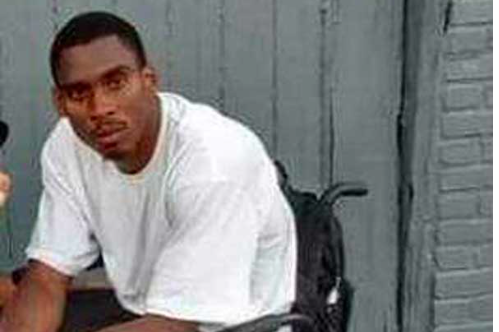
May 12, 2016
 Source/Legacy.com
Source/Legacy.com
Jeremy McDole, of Wilmington, was fatally shot by police on September 23, 2015.
The Delaware Department of Justice has cleared four police officers of wrongdoing in the fatal shooting of an armed wheelchair-bound Wilmington man last September.
A report released Thursday detailed the outcome of an investigation by the DoJ that found the Wilmington police officers acted within the scope of the department's use-of-force policy.
The 31-page DoJ report provides a full analysis of the circumstances, evidence and grounds for declining to prosecute the four officers involved in the shooting of 28-year-old Jeremy "Bam" McDole outside of an Autozone store. The incident took place on Sept. 23, 2015.
On the day of the incident, a woman described as an acquaintance of McDole's called 911 to report what she believed were self-inflicted gunshots fired by McDole, who had been paralyzed from the waist down at 18 years old as a result of a gunshot wound. Four police officers who arrived at the scene, initially unaware of the specifics of the 911 call, encountered McDole in his wheelchair, in broad daylight, with a .38-caliber gun that had not been drawn.
A cellphone video of the shooting, first published on LiveLeak, shows multiple officers with guns drawn ordering McDole to drop his gun in the area of Tulip and Scott streets in the Bayard Square section of the city. The officers' orders can be heard repeated several times before they closed in on McDole and simultaneously opened fire. McDole was struck several times before slumping out of his wheelchair. He was pronounced dead at the scene.
"Our investigation revealed serious deficiencies in the way in which the Wilmington Police Department prepares its police officers to deal with situations like the one that Mr. McDole presented, specifically with regard to use of force policies and training and policies for dealing with individuals with mental illness, disabilities or cognitive impairments," the DOJ concluded. "Most significantly, we find that the 'continuum of force' provisions of the Wilmington Police Department’s use of force policy are effectively meaningless for police officers as currently written."
Based in part on these deficiencies, the DoJ could not find probable cause to charge three of the fours officers involved in the shooting, the report said. They believed, according to transcripts of radio dispatches, that McDole was reaching for his weapon.
"Through our investigation, we determined that these three officers believed – at the moment they discharged their firearms – that doing so was necessary to protect themselves, or others, against death or serious physical injury," the report said. "Because of that belief, they were entitled under Delaware law to use deadly force to subdue Mr. McDole."
The Delaware Attorney General did believe the state should gather evidence to pursue a felony assault charge against the fourth officer, Senior Corporal Joseph Dellose, in light of his conduct when confronting McDole without first communicating with officers he knew were on the scene.
"After hiring a former federal prosecutor from Pennsylvania to prepare a case for possible criminal prosecution and after consulting with two nationally recognized police use-of-force experts who had recently recommended criminal charges against the Cleveland police officer who [fatally] shot Tamir Rice, and after receiving opinions from both of those experts that S/Cpl Dellose’s actions did not constitute criminal conduct under the Delaware Code, DOJ concluded that it could not proceed with a criminal prosecution against S/Cpl Dellose given that the defense would present unchallenged expert testimony that S/Cpl Dellose’s conduct was reasonable," the report said.
The DOJ nevertheless described Dellose's conduct in the case as "extraordinarily poor police work" that should bar him from continued employment with the Wilmington Police Department or in any role requiring him to carry a firearm in public.
At the time of the incident, family and friends of McDole challenged the police account of the shooting, the officers' decision not to attempt to use lesser forms of force (i.e. stun gun, pepper spray, tear gas or bean bag shotgun), and the initial report that McDole had attempted suicide.
A protest was held in January, according to The News Journal, and earlier this month the McDole family filed a civil rights lawsuit against the city of Wilmington. The lawsuit seeks damages for what the family has called a wrongful death, including funeral expenses, suffering and pain, loss of civil rights and emotional distress.
The full Delaware Department of Justice report — along with video, audio and photo evidence referenced in its pages — can be read here.